Index relies entirely on the support of donors and readers to do its work.
Help us keep amplifying censored voices today.
[vc_row][vc_column][vc_custom_heading text=”La escasez de papel de periódico en Venezuela ha obligado a algunos periódicos a cerrar, pero los medios digitales se están expandiendo con rapidez para ocupar su lugar y mantener a la gente al tanto de las últimas noticias. Luis Carlos Díaz informa desde Caracas”][vc_row_inner][vc_column_inner][vc_column_text]
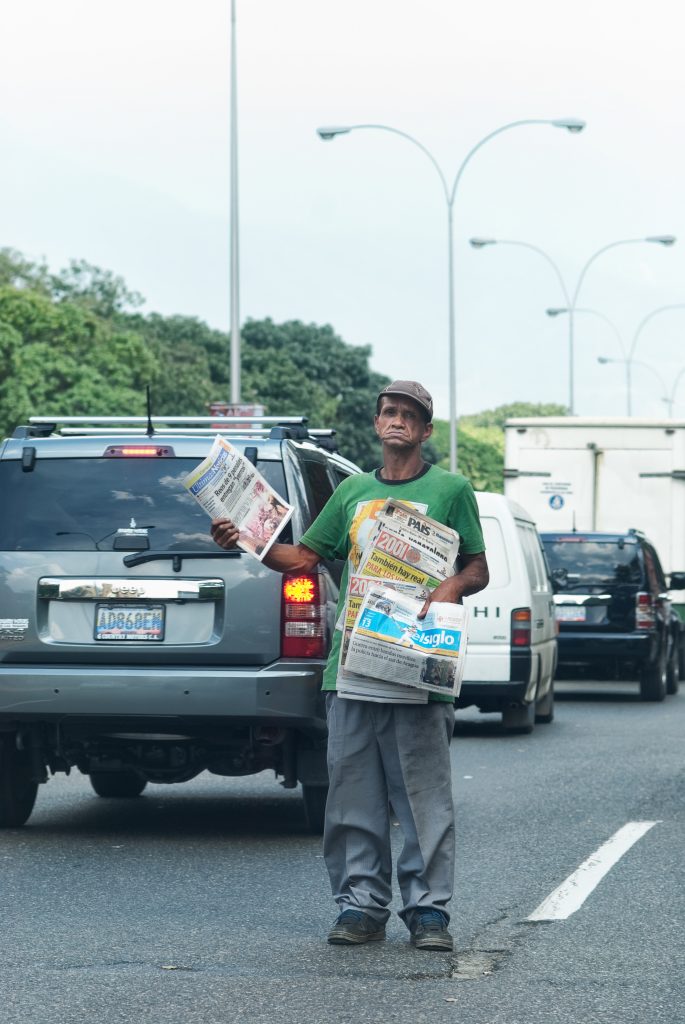
Un hombre vende periódicos en Caracas, Venezuela, FStoplight/iStock
[/vc_column_text][/vc_column_inner][/vc_row_inner][/vc_column][/vc_row][vc_row][vc_column][vc_column_text]
[/vc_column_text][/vc_column][/vc_row][vc_row][vc_column width=”3/4″][vc_column_text]
[/vc_column_text][/vc_column][/vc_row][vc_row][vc_column][vc_column_text]
[/vc_column_text][/vc_column][/vc_row][vc_row][vc_column][vc_column_text]
[/vc_column_text][/vc_column][/vc_row][vc_row content_placement=”top”][vc_column width=”1/3″][vc_custom_heading text=”Seeing the future of journalism” font_container=”tag:p|font_size:24|text_align:left” link=”url:https%3A%2F%2Fwww.indexoncensorship.org%2F2014%2F09%2Fseeing-the-future-of-journalism%2F|||”][vc_column_text]While debates on the future of the media tend to focus solely on new technology and downward financial pressures, we ask: will the public end up knowing more or less? Who will hold power to account? The subject is tackled from all angles, from our writers from across the globe.
With: Iona Craig, Taylor Walker, Will Gore[/vc_column_text][/vc_column][vc_column width=”1/3″][vc_single_image image=”80562″ img_size=”medium” alignment=”center” onclick=”custom_link” link=”https://www.indexoncensorship.org/2014/09/seeing-the-future-of-journalism/”][/vc_column][vc_column width=”1/3″ css=”.vc_custom_1481888488328{padding-bottom: 50px !important;}”][vc_custom_heading text=”Subscribe” font_container=”tag:p|font_size:24|text_align:left” link=”url:https%3A%2F%2Fwww.indexoncensorship.org%2Fsubscribe%2F|||”][vc_column_text]In print, online. In your mailbox, on your iPad.
Subscription options from £18 or just £1.49 in the App Store for a digital issue.
Every subscriber helps support Index on Censorship’s projects around the world.
![]() SUBSCRIBE NOW[/vc_column_text][/vc_column][/vc_row]
SUBSCRIBE NOW[/vc_column_text][/vc_column][/vc_row]
[vc_row][vc_column][vc_column_text]
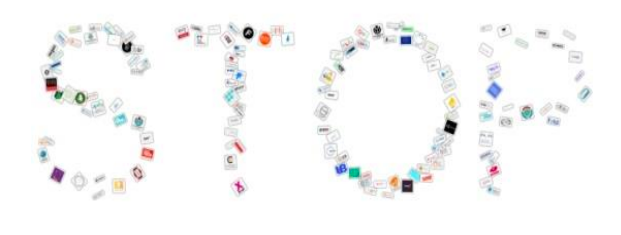
Brussels, 26 April 2018
OPEN LETTER IN LIGHT OF THE 27 APRIL 2018 COREPER I MEETING
Your Excellency Ambassador, cc. Deputy Ambassador,
We, the undersigned, are writing to you ahead of your COREPER discussion on the proposed Directive on copyright in the Digital Single Market.
We are deeply concerned that the text proposed by the Bulgarian Presidency in no way reflects a balanced compromise, whether on substance or from the perspective of the many legitimate concerns that have been raised. Instead, it represents a major threat to the freedoms of European citizens and businesses and promises to severely harm Europe’s openness, competitiveness, innovation, science, research and education.
A broad spectrum of European stakeholders and experts, including academics, educators, NGOs representing human rights and media freedom, software developers and startups have repeatedly warned about the damage that the proposals would cause. However, these have been largely dismissed in rushed discussions taking place without national experts being present. This rushed process is all the more surprising when the European Parliament has already announced it would require more time (until June) to reach a position and is clearly adopting a more cautious approach.
If no further thought is put in the discussion, the result will be a huge gap between stated intentions and the damage that the text will actually achieve if the actual language on the table remains:
With so many legal uncertainties and collateral damages still present, this legislation is currently destined to become a nightmare when it will have to be transposed into national legislation and face the test of its legality in terms of the Charter of Fundamental Rights and the Bern Convention.
We hence strongly encourage you to adopt a decision-making process that is evidence-based, focussed on producing copyright rules that are fit for purpose and on avoiding unintended, damaging side effects.
Yours sincerely,
The over 145 signatories of this open letter – European and global organisations, as well as national organisations from 28 EU Member States, represent human and digital rights, media freedom, publishers, journalists, libraries, scientific and research institutions, educational institutions including universities, creator representatives, consumers, software developers, start-ups, technology businesses and Internet service providers.
EUROPE
1. Access Info Europe
2. Allied for Startups
3. Association of European Research Libraries (LIBER)
4. Civil Liberties Union for Europe (Liberties)
5. Copyright for Creativity (C4C)
6. Create Refresh Campaign
7. DIGITALEUROPE
8. EDiMA
9. European Bureau of Library, Information and Documentation Associations (EBLIDA)
10. European Digital Learning Network (DLEARN)
11. European Digital Rights (EDRi)
12. European Internet Services Providers Association (EuroISPA)
13. European Network for Copyright in Support of Education and Science (ENCES)
14. European University Association (EUA)
15. Free Knowledge Advocacy Group EU
16. Lifelong Learning Platform
17. Public Libraries 2020 (PL2020)
18. Science Europe
19. South East Europe Media Organisation (SEEMO)
20. SPARC Europe
AUSTRIA
21. Freischreiber Österreich
22. Internet Service Providers Austria (ISPA Austria)
BELGIUM
23. Net Users’ Rights Protection Association (NURPA)
BULGARIA
24. BESCO – Bulgarian Startup Association
25. BlueLink Foundation
26. Bulgarian Association of Independent Artists and Animators (BAICAA)
27. Bulgarian Helsinki Committee
28. Bulgarian Library and Information Association (BLIA)
29. Creative Commons Bulgaria
30. DIBLA
31. Digital Republic
32. Hamalogika
33. Init Lab
34. ISOC Bulgaria
35. LawsBG
36. Obshtestvo.bg
37. Open Project Foundation
38. PHOTO Forum
39. Wikimedians of Bulgaria
CROATIA
40. Code for Croatia
CYPRUS
41. Startup Cyprus
CZECH REPUBLIC
42. Alliance pro otevrene vzdelavani (Alliance for Open Education)
43. Confederation of Industry of the Czech Republic
44. Czech Fintech Association
45. Ecumenical Academy
46. EDUin
DENMARK
47. Danish Association of Independent Internet Media (Prauda) ESTONIA
48. Wikimedia Eesti
FINLAND
49. Creative Commons Finland
50. Open Knowledge Finland
51. Wikimedia Suomi
FRANCE
52. Abilian
53. Alliance Libre
54. April
55. Aquinetic
56. Conseil National du Logiciel Libre (CNLL)
57. France Digitale
58. l’ASIC
59. Ploss Auvergne-Rhône-Alpes (PLOSS-RA)
60. Renaissance Numérique
61. Syntec Numérique
62. Tech in France
63. Wikimédia France
GERMANY
64. Arbeitsgemeinschaft der Medieneinrichtungen an Hochschulen e.V. (AMH)
65. Bundesverband Deutsche Startups
66. Deutscher Bibliotheksverband e.V. (dbv)
67. eco – Association of the Internet Industry
68. Factory Berlin
69. Initiative gegen ein Leistungsschutzrecht (IGEL)
70. Jade Hochschule Wilhelmshaven/Oldenburg/Elsfleth
71. Karlsruhe Institute of Technology (KIT)
72. Landesbibliothekszentrum Rheinland-Pfalz
73. Silicon Allee
74. Staatsbibliothek Bamberg
75. Ubermetrics Technologies
76. Universitäts- und Landesbibliothek Sachsen-Anhalt (Martin-Luther-University Halle-Wittenberg)
77. University Library of Kaiserslautern (Technische Universität Kaiserslautern)
78. Verein Deutscher Bibliothekarinnen und Bibliothekare e.V. (VDB)
79. ZB MED – Information Centre for Life Sciences
GREECE
80. Greek Free Open Source Software Society (GFOSS)
HUNGARY
81. Hungarian Civil Liberties Union
82. ICT Association of Hungary – IVSZ
83. K-Monitor
IRELAND
84. Technology Ireland
ITALY
85. Hermes Center for Transparency and Digital Human Rights
86. Istituto Italiano per la Privacy e la Valorizzazione dei Dati
87. Italian Coalition for Civil Liberties and Rights (CILD)
88. National Online Printing Association (ANSO)
LATVIA
89. Startin.LV (Latvian Startup Association)
90. Wikimedians of Latvia User Group
LITHUANIA
91. Aresi Labs
LUXEMBOURG
92. Frënn vun der Ënn
MALTA
93. Commonwealth Centre for Connected Learning
NETHERLANDS
94. Dutch Association of Public Libraries (VOB)
95. Kennisland
POLAND
96. Centrum Cyfrowe
97. Coalition for Open Education (KOED)
98. Creative Commons Polska
99. Elektroniczna BIBlioteka (EBIB Association)
100. ePaństwo Foundation
101. Fundacja Szkoła z Klasą (School with Class Foundation)
102. Modern Poland Foundation
103. Ośrodek Edukacji Informatycznej i Zastosowań Komputerów w Warszawie (OEIiZK)
104. Panoptykon Foundation
105. Startup Poland
106. ZIPSEE
PORTUGAL
107. Associação D3 – Defesa dos Direitos Digitais (D3)
108. Associação Ensino Livre
109. Associação Nacional para o Software Livre (ANSOL)
110. Associação para a Promoção e Desenvolvimento da Sociedade da Informação (APDSI)
ROMANIA
111. ActiveWatch
112. APADOR-CH (Romanian Helsinki Committee)
113. Association for Technology and Internet (ApTI)
114. Association of Producers and Dealers of IT&C equipment (APDETIC)
115. Center for Public Innovation
116. Digital Citizens Romania
117. Kosson.ro Initiative
118. Mediawise Society
119. National Association of Public Librarians and Libraries in Romania (ANBPR)
SLOVAKIA
120. Creative Commons Slovakia
121. Slovak Alliance for Innovation Economy (SAPIE)
SLOVENIA
122. Digitas Institute
123. Forum za digitalno družbo (Digital Society Forum)
SPAIN
124. Asociación de Internautas
125. Asociación Española de Startups (Spanish Startup Association)
126. MaadiX
127. Sugus
128. Xnet
SWEDEN
129. Wikimedia Sverige
UK
130. Libraries and Archives Copyright Alliance (LACA)
131. Open Rights Group (ORG)
132. techUK
GLOBAL
133. ARTICLE 19
134. Association for Progressive Communications (APC)
135. Center for Democracy & Technology (CDT)
136. COMMUNIA Association
137. Computer and Communications Industry Association (CCIA)
138. Copy-Me
139. Creative Commons
140. Electronic Frontier Foundation (EFF)
141. Electronic Information for Libraries (EIFL)
142. Index on Censorship
143. International Partnership for Human Rights (IPHR)
144. Media and Learning Association (MEDEA)
145. Open Knowledge International (OKI)
146. OpenMedia
147. Software Heritage
[/vc_column_text][vc_row_inner][vc_column_inner][vc_basic_grid post_type=”post” max_items=”4″ element_width=”6″ grid_id=”vc_gid:1524750347203-f1e70660-87dd-9″ taxonomies=”1908″][/vc_column_inner][/vc_row_inner][/vc_column][/vc_row]
A public art project and website celebrating dissent in Cuba and a collective of young bloggers and web activists who give voice to the opinions of young people from all over the Democratic Republic of Congo are among the winners of the 2018 Index on Censorship Freedom of Expression Awards.
The winners, who were announced on Thursday evening at a gala ceremony in London, also include one of the only human rights organisations still operating in Egypt and an investigative journalist from Honduras who regularly risks her life for her right to report on what is happening in the country.
Awards were presented in four categories: arts, campaigning, digital activism and journalism.
The winners are: Cuban art collective The Museum of Dissidence (arts); the Egyptian Commission for Rights and Freedoms (campaigning); Habari RDC, a collective of young Congolese bloggers and activists (digital activism); and Honduran investigative journalist Wendy Funes (journalism).
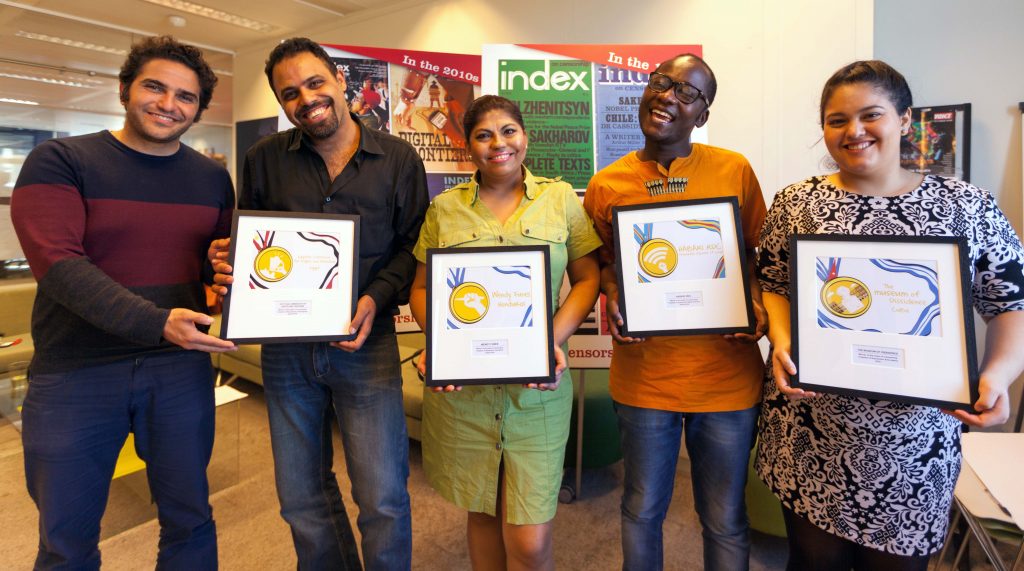
From right: Human rights defenders Mohamed Sameh and Ahmad Abdallah of 2018 Freedom of Expression Campaigning Award-winning Egypt Commission on Rights and Freedoms; 2018 Freedom of Expression Journalism Award-winning Honduran investigative journalist Wendy Funes; Congolese digital activist Guy Muyembe of 2018 Freedom of Expression Digital Activism Award-winning Habari RDC; Perla Hinojosa, Fellowship and Advocacy Officer at Index on Censorship, holds the 2018 Freedom of Expression Arts Award for Cuban arts collective Museum of Dissidence, who could not attend the Freedom of Expression Awards. (Photo: Index on Censorship)
“These winners deserve global recognition for their amazing work,” said Index on Censorship CEO Jodie Ginsberg. “Like all those nominated, they brave massive personal and political hurdles simply so that others can express themselves freely.”
Drawn from more than 400 public nominations, the winners were presented with their awards at a ceremony at The Mayfair Hotel, London, hosted by “stand-up poet” Kate Fox.
Actors, writers and musicians were among those celebrating with the winners. The guest list included The Times columnist and Chair of Index David Aaronovitch, BBC presenter Jonathan Dimbleby, comedian Shazia Mirza, social human rights activists Nimco Ali and Sara Khan, Serpentine Galleries CEO Yana Peel, poet Sabrina Mahfouz, Channel 4’s Lindsey Hilsum and more.
Winners were presented with cartoons created by Khalid Albaih, a Romanian-born Sudanese social media based political cartoonist who considers himself a virtual revolutionist.
Each of the award winners will become part of the fourth cohort of Freedom of Expression Awards fellows. They join last year’s winners — Chinese political cartoonist Rebel Pepper (arts); Russian human rights activist Ildar Dadin (campaigning); Digital collective Turkey Blocks (digital activism); news outlet Maldives Independent and its former editor Zaheena Rasheed (journalism) — as part of a world-class network of campaigners, activists and artists sharing best practices on tackling censorship threats internationally.
Through the fellowship, Index works with the winners – both during an intensive week in London and the rest of the awarding year – to provide longer term, structured support. The goal is to help winners maximise their impact, broaden their support and ensure they can continue to excel at fighting free expression threats on the ground.
This year’s panel of judges included Razia Iqbal, a journalist for BBC News, Tim Moloney QC, deputy head of Doughty Street Chambers, Yana Peel, CEO of the Serpentine Galleries, and Eben Upton CBE, a founder of the Raspberry Pi Foundation and CEO of Raspberry Pi.
Awards judge Eben Upton said: “”The ability to speak freely is a key foundation of democratic society and the rule of law: absent the ability to openly identify the abuse of power, extractive economic conditions, and exclusive political institutions, proliferate. This is why freedom of expression is so precious, and so often under attack from those in power.”
This is the 18th year of the Freedom of Expression Awards. Former winners include activist Malala Yousafzai, cartoonist Ali Ferzat, journalists Anna Politkovskaya and Fergal Keane, and Bahrain Center for Human Rights.
Ziyad Marar, President of Global Publishing at SAGE said: “The protection and promotion of free speech is a belief firmly entrenched within our values at SAGE. As both publisher of the magazine and sponsors of tonight’s awards, we are proud to support Index in their mission as they defend this right globally. We offer our warmest congratulations to those recognised and remain both humbled and awed by their inspirational achievements.”
Further details about the award winners are below.
For interviews with the award winners, who are in London until Friday 20 April, please contact Sean Gallagher at [email protected].
Photographs and other content related to the awards night will be available beginning 11am on Friday 20 April. Please contact Sean Gallagher at [email protected].
Index on Censorship is grateful for the support of the 2018 Freedom of Expression Awards sponsors: SAGE Publishing, Google, Private Internet Access, Edwardian Hotels, Vodafone, Vice News, Doughty Street Chambers and former Index Award-winning Psiphon.
Index on Censorship Freedom of Expression Awards 2018 – background on winners
Arts – The Museum of Dissidence (Cuba)
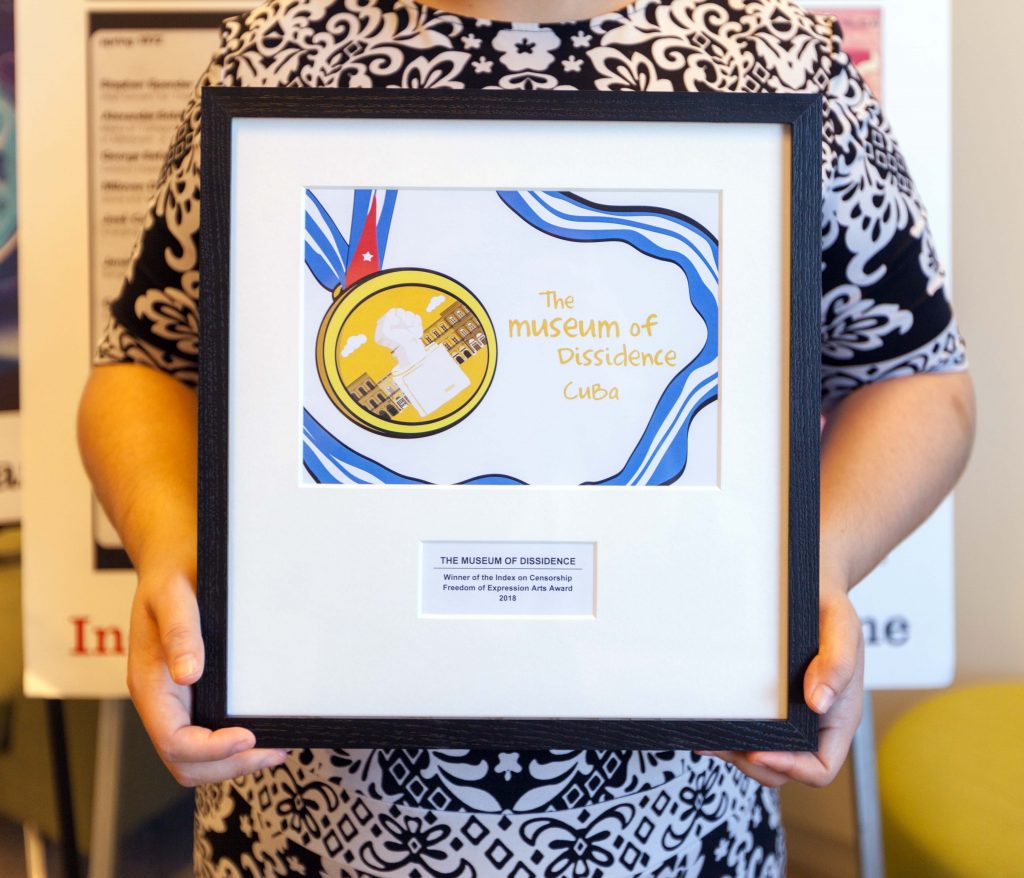
Perla Hinojosa, Fellowship and Advocacy Officer at Index on Censorship, holds the 2018 Freedom of Expression Arts Award for Cuban arts collective Museum of Dissidence, who could not attend the Freedom of Expression Awards. (Photo: Index on Censorship)
The Museum of Dissidence is a public art project and website celebrating dissent in Cuba. Set up in 2016 by acclaimed artist Luis Manuel Otero Alcántara and curator Yanelys Nuñez Leyva, their aim is to reclaim the word “dissident” and give it a positive meaning in Cuba. The museum organises radical public art projects and installations, concentrated in the poorer districts of Havana. Their fearlessness in opening dialogues and inhabiting public space has led to fierce repercussions: Nuñez was sacked from her job and Otero arrested and threatened with prison for being a “counter-revolutionary.” Despite this, they persist in challenging Cuba’s restrictions on expression.
CEO of Serpentine Galleries and 2018 Freedom of Expression Award judge Yana Peel said: The Museum of Dissidence in Cuba is incredibly important for the safe space that it is providing for unsafe ideas. It is a tremendous platform through which the great artists of Cuba bring Cuba to the global stage.”
Campaigning – The Egyptian Commission for Rights and Freedoms (Egypt). Award supported by Doughty Street Chambers
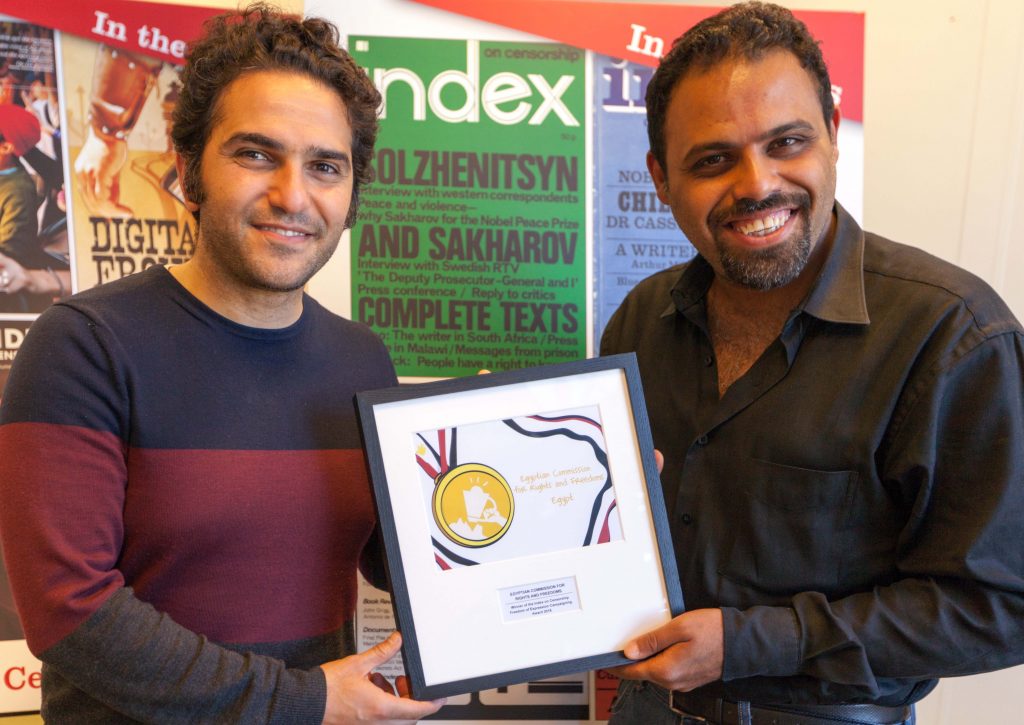
Human rights defenders Mohamed Sameh and Ahmad Abdallah of 2018 Freedom of Expression Campaigning Award-winning Egypt Commission on Rights and Freedoms. (Photo: Index on Censorship)
The Egyptian Commission for Rights and Freedoms is one of the few human rights organisations still operating in a country which has waged an orchestrated campaign against independent civil society groups. Egypt is becoming increasingly hostile to dissent, but ECRF continues to provide advocacy, legal support and campaign coordination, drawing attention to the many ongoing human rights abuses under the autocratic rule of President Abdel Fattah-el-Sisi. Their work has seen them subject to state harassment, their headquarters have been raided and staff members arrested. ECRF are committed to carrying on with their work regardless of the challenges.
CEO of Raspberry Pi and Freedom of Expression Awards 2018 judge Eben Upton said: “In an environment when organisations have had to step back or disappear altogether, they’ve managed to keep going and just that persistence over a period of time in a difficult environment is inspiring”.
Digital Activism – Habari RDC (Congo). Award sponsored by Private Internet Access
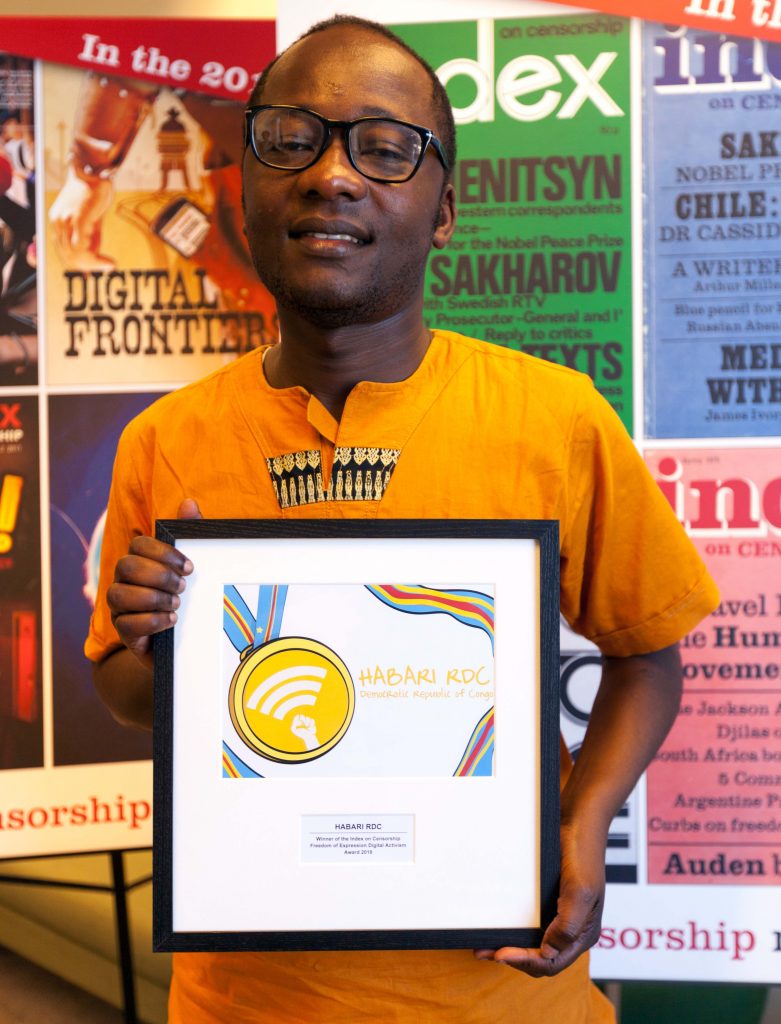
Congolese digital activist Guy Muyembe of 2018 Freedom of Expression Digital Activism Award-winning Habari RDC (Photo: Index on Censorship)
Launched in 2016, Habari RDC is a collective of more than 100 young Congolese bloggers and web activists, who use Facebook, Twitter and YouTube to give voice to the opinions of young people from all over the Democratic Republic of Congo. Their site posts stories and cartoons about politics, but it also covers football, the arts and subjects such as domestic violence, child exploitation, the female orgasm and sexual harassment at work. Habari RDC offers a distinctive collection of funny, angry and modern Congolese voices, who are demanding to be heard.
Journalist and 2018 Freedom of Expression Awards judge Razia Iqbal aid: “They’re doing something which is actually very hard to do, which is make sure that the future generation know what’s happening in their own country, are willing to speak to each other about it and be active politically”.
Journalism – Wendy Funes (Honduras). Award sponsored by VICE News
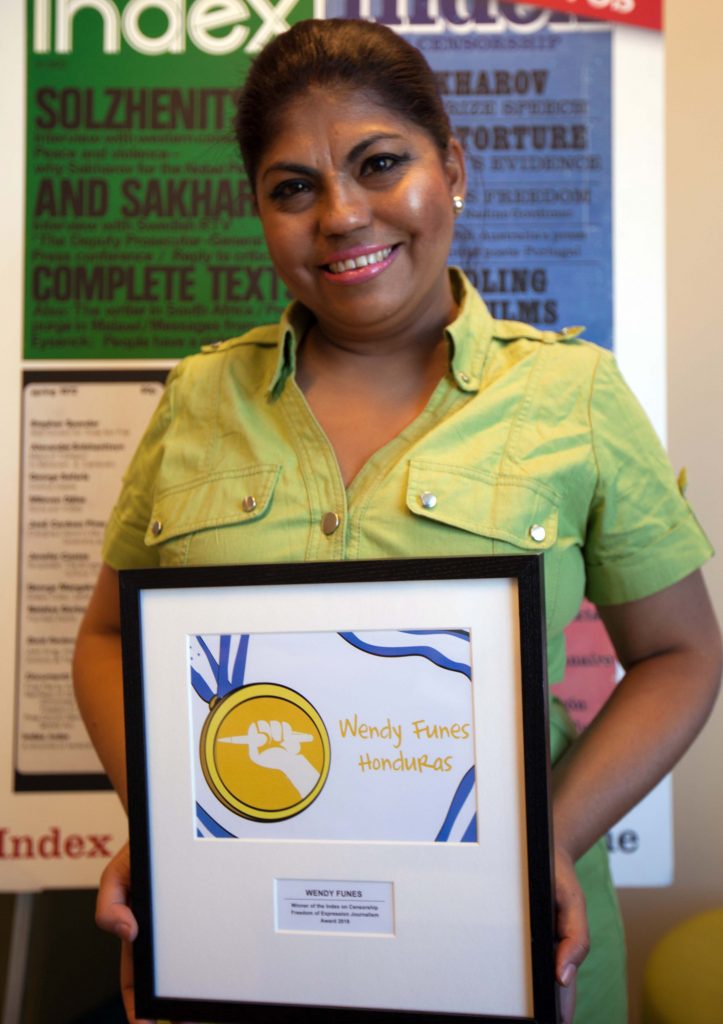
2018 Freedom of Expression Journalism Award-winning Honduran investigative journalist Wendy Funes. (Photo: Index on Censorship)
Wendy Funes is an investigative journalist from Honduras who regularly risks her life for her right to report on what is happening in the country, an extremely harsh environment for reporters. Two journalists were murdered in 2017 and her father and friends are among those who have met violent deaths in the country – killings for which no one has ever been brought to justice. Funes meets these challenges with creativity and determination. For one article she had her own death certificate issued to highlight corruption. Funes also writes about violence against women, a huge problem in Honduras where one woman is killed every 16 hours.
Journalist and 2018 Freedom of Expression Awards judge Razia Iqbal QC said: “She is courageous in the face of death threats. She is courageous in the face of censorship. She is courageous just in terms of getting up every morning and saying I’m going to continue to do what I am doing.”
ABOUT THE FREEDOM OF EXPRESSION AWARDS AND FELLOWSHIP
The Index on Censorship Freedom of Expression Awards recognise those individuals and groups making the greatest impact in tackling censorship worldwide. Established 18 years ago, the awards shine a light on work being undertaken in defence of free expression globally. Often these stories go unnoticed or are ignored by the mainstream press. Through the fellowship, Index works with the winners – both during an intensive week in London and the rest of the awarding year – to provide longer term, structured support. The goal is to help winners maximise their impact, broaden their support and ensure they can continue to excel at fighting free expression threats on the ground.
ABOUT INDEX ON CENSORSHIP
Index on Censorship is a UK-based nonprofit that campaigns against censorship and promotes free expression worldwide. Founded in 1972, Index has published some of the world’s leading writers and artists in its award-winning quarterly magazine, including Nadine Gordimer, Mario Vargas Llosa, Samuel Beckett and Kurt Vonnegut. Index promotes debate, monitors threats to free speech and supports individuals through its annual awards and fellowship program.
[vc_row][vc_column][vc_video link=”https://youtu.be/Cc3K8Bcvt6Y”][vc_column_text]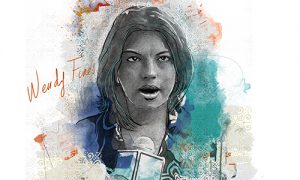 Wendy Funes is an investigative journalist from Honduras who regularly risks her life for her right to report on what is happening in the country, an extremely harsh environment for reporters. Two journalists were murdered in 2017 and her father and friends are among those who have met violent deaths in the country – killings for which no one has ever been brought to justice. Funes meets these challenges with creativity and determination. For one article she had her own death certificate issued to highlight corruption. Funes also writes about violence against women, a huge problem in Honduras where one woman is killed every 16 hours.[/vc_column_text][/vc_column][/vc_row][vc_row][vc_column][awards_fellows years=”2018″][vc_basic_grid post_type=”post” max_items=”12″ style=”load-more” items_per_page=”4″ element_width=”6″ grid_id=”vc_gid:1524476008020-fceb892e-6e72-0″ taxonomies=”23255″][/vc_column][/vc_row]
Wendy Funes is an investigative journalist from Honduras who regularly risks her life for her right to report on what is happening in the country, an extremely harsh environment for reporters. Two journalists were murdered in 2017 and her father and friends are among those who have met violent deaths in the country – killings for which no one has ever been brought to justice. Funes meets these challenges with creativity and determination. For one article she had her own death certificate issued to highlight corruption. Funes also writes about violence against women, a huge problem in Honduras where one woman is killed every 16 hours.[/vc_column_text][/vc_column][/vc_row][vc_row][vc_column][awards_fellows years=”2018″][vc_basic_grid post_type=”post” max_items=”12″ style=”load-more” items_per_page=”4″ element_width=”6″ grid_id=”vc_gid:1524476008020-fceb892e-6e72-0″ taxonomies=”23255″][/vc_column][/vc_row]